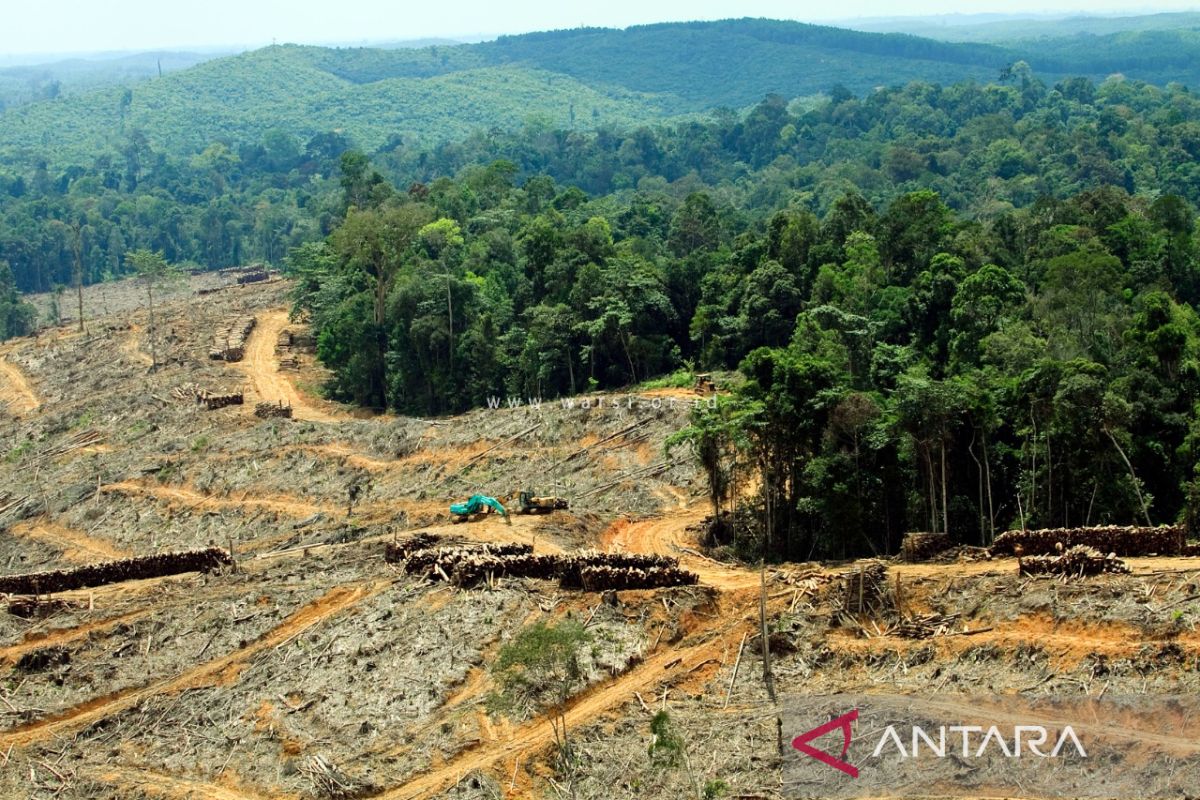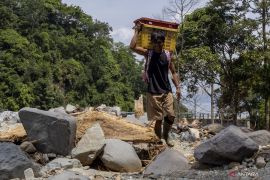World Environment Day aims to promote and instill awareness or concern for the preservation and improvement of the environment. This year's theme brought up the message that one should care about the earth for future use, as it was the only living space for humans.
"Speaking of the environment, currently, the earth and our environment are going through three crises, which are climate change, damage to nature (in proportion with the) declining biodiversity, and pollution," Director of the Indonesian Conservation Community Warsi Rudy Syaf stated on Sunday.
Climate change, which is the aftermath of global warming, has lead to an increase in global temperatures, changes in weather, rise in sea water temperatures, as well as resulted in the melting of the icy surfaces in polar areas.
The Meteorology, Climatology, and Geophysics Agency stated that Indonesia recorded an increase in temperatures in the western and central regions, the highest temperature rise of 0.95 degrees Celsius per decade. This condition has raised concerns among some people, who noticed high temperatures in several areas since the start of May 2022.
"The threat of climate change is real. It triggers ecological and hydrological disasters with various derivatives, food shortages, diseases, and others," he added.
The National Disaster Mitigation Agency published the information pertaining to the threat, which mentioned that 98 percent of the natural disasters in Indonesia in the last decade were related to meteorological aspects, such as rainfall, humidity, temperature, and wind with lightning.
Global warming
Last year, Indonesia was struck with extreme rainy weather and increased rainfall intensity. The latter reached 20-70 percent, which resulted in flash floods in several parts of Indonesia, including southern Sumatra, Java, Bali, East Nusa Tenggara, southern Kalimantan, and southern Sulawesi.
In 2021, as many as 5,402 disasters were recorded in Indonesia, which are predominantly floods and extreme weather. Some 4,650 disasters, with 1,518 incidents of floods and 1,386 occurrences of tornadoes were recorded in 2020.
According to the 2021 End of Year Notes issued by Indonesian Conservation Community Warsi, several ecological disasters had struck Jambi and West Sumatra. Some 20 incidents of floods were recorded in several places, such as Jambi City, Batanghari District, Muaro Jambi District, Sarolangun District, and Kerinci District.
Meanwhile, in West Sumatra, 11 incidents of floods were recorded in South Solok, Solok City, Padang Panjang, Pesisir Selatan, Solok District, Sijunjung, Padang City, and Siberut. Eight incidents of landslides occurred over the course of the year in Padang Pariaman, Dharmasraya, Bukittinggi, Agam, Payakumbuh, and Solok.
The hydrological disaster that struck Jambi Province resulted in two deaths, 6,265 houses being flooded, and 635 hectares of land being inundated. In West Sumatra, nine people lost their lives, while 3,181 houses were flooded.
"The (likelihood) of ecological disasters (is directly proportional) to the changes in (the) forest area due to human activities. Forest encroachment, illegal mining in the forest, and timber theft also caused ecological disasters," Syaf remarked.
Forest areas, which were supposedly able to reduce the effects of greenhouse gases, appeared powerless in doing so due to uncontrolled, severe damage. Trees, which make up the forest areas, were actually expected to bind carbon dioxide, which forms greenhouse gases in the air. This aimed to prevent the substances from ascending to the atmosphere, which would thin out the ozone layer and cause global warming and lead to climate change.
Social forestry
Forests were supposed to function as the guardians to maintain the climate. However, constant degradation and deforestation every year due to forest fires and land clearing, either conducted legally or illegally, have had a negative impact.
Based on data from Global Forest Watch (GFW), Indonesia had 93.8 million hectares of primary forests in 2001, which constituted more than half of the land area. However, some 9.75 million hectares of that area had been lost during the 2002-2020 period.
Consequently, Indonesia lost 36 percent of its forest area during the same period. Should this situation persist, it would compromise the sustainability of life on earth.
Since forests had a vital role to play in minimizing global warming, their well-being should be prioritized by countries that still have large forest areas, such as Indonesia.
"There are many things we can do to (contribute in the efforts to) protect our earth, (such as by improving the) forest functions by restoring the remaining forest areas and also (improving the) forests' ecological functions, one of which was done through the social forestry scheme akin to what the Indonesian Conservation Community Warsi had done," he elaborated.
By involving the public in forest management, a sense of contribution or ownership in protecting the forest could be fostered, he affirmed.
"A good experience in Jambi, by referring to the Indonesian Conservation Community Warsi's records in 2021, indicates that the coverage of social forestry areas had increased. This was shown by analysis of the sentinel images. It was found that there was an increase in forest coverage spanning an area of 14,390 hectares in social forestry areas in Jambi," he stated.
Protecting biodiversity
The methods to improve the area included community utilization and management activities by developing agroforests in social forestry areas.
However, the restoration of forest areas does not solely rely on social forestry activities. Everyone must participate in the efforts to protect forest areas by taking restorative measures, preventing forest fires, and restoring area surrounding watersheds.
Hence, let us return to the forest. Forests can minimize the impact of global warming.
Developments conducted adjacent to forest areas must also employ a sustainable, eco-friendly orientation.
One should take forest issues as a factor in controlling global warming seriously or else it would impact the future generations negatively.
Climate change is a major threat to the environment, and forests are part of the environment. If one maintains the forests, then it means that they were already protecting the environment itself, with all its biodiversity dwelling in it.
Happy World Environment Day.
Editor: Rahmad Nasution
Copyright © ANTARA 2022










